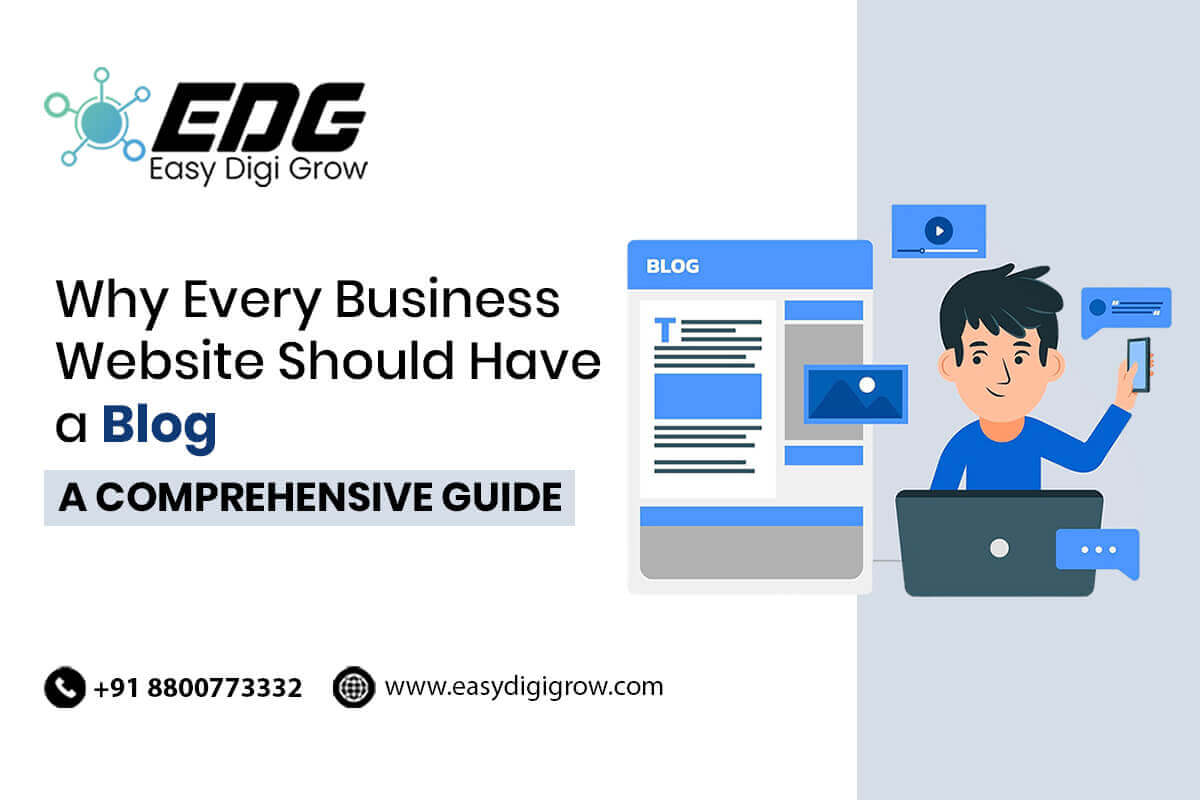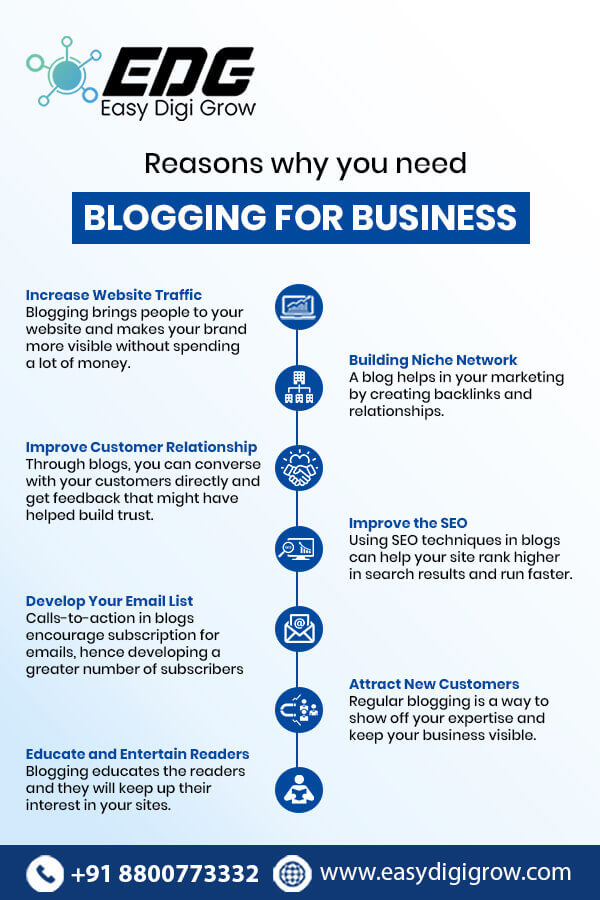What is a blog ?
Blogging for business has been a popular marketing method because it may efficiently promote your brand. A company might utilize a blog to emphasize its products and services, communicate with followers, and attract additional website traffic. Sharing meaningful material can help a company improve its brand image and acquire customer trust.
In fact, companies who build blogs get 67% more leads. That’s because blogging enables business owners to provide valuable material while also engaging with new and existing consumers.
In this blog, we will delve further into the definition of business blogging. We’ll also discuss how a business might profit from having a blog.
What Is Blogging for Business
Business blogging is a strategy of marketing in which blog posts are used to help businesses enhance brand awareness and build an online presence. A business blog will usually be found on the company’s website.
It increases traffic and allows potential buyers to learn about various of a company’s products and services.
To start your blog, choose:
- The ideal blogging platform for your needs
- A domain name.
- A web hosting plan.
Many businesses create their blogs using WordPress because it provides numerous customization possibilities and complete control over your website.
Importance of Blogging for Business
Blogs are useful for businesses these days because they help them build a strong online profile and engage with customers. Blogs bring more visitors and keep potential customers interested, because they showcase knowledge and provide useful information. Here are 5 reasons why blogging is important for business.
- Improves Online Visibility: Blogging helps your company appear in search engine results, making it easier for potential clients to locate you online.
- Builds Trust and Authority: Sharing valuable material on a regular basis through blogs portrays your company as an expert in your sector, hence increasing trust with your target audience.
- Engages Your Audience: Blogging allows you to communicate with your customers, answer their queries, and provide them with engaging information.
- Supports Marketing Efforts: Blogs can be shared on social media, newsletters, and other platforms, increasing your marketing reach.
- Lead Generation: By providing useful content, blogs can attract new visitors and convert them into potential consumers using call-to-action buttons.
Adding blogging to your business will increase online presence and engagement with your customers. Regularly creating excellent content that builds loyal customers, preparing your brand for long-term growth and success.
why you need blogging for business
Here 7 essential reasons why should blogging is need for business:
- Drive More Traffic to the Website
Create blog content that addresses the requirements of your target audience to attract more readers. Blogging is an inexpensive way to attract visitors, particularly for small businesses. Regular updates improve search rankings and establish authority, boosting organic traffic and brand recognition.
- Create a Network in the Niche
A company blog drives traffic and offers networking opportunities like backlinks and collaborations. Link to relevant sites and engage with other blogs to build connections. Monitoring competitors’ blogs might help you improve your marketing strategy and stay competitive.
- Enhance Customer Relations
A blog improves consumer relationships by enabling direct communication via comments and feedback. Sharing success stories reveals how your goods address challenges. This involvement builds client trust and loyalty.
- Increase Overall Website SEO
SEO methods such as keyword utilization, alt text, and internal links improve your website’s search visibility. Improving elements such as page speed, user experience, and mobile friendliness improves SEO results. A well-optimized blog allows your target audience to find you more easily.
- Expand Your Email List
A blog is an effective strategy for expanding your email list. By providing CTAs or internal links in your posts, you may urge readers to join your email list, allowing you to reach a larger audience and nurture leads.
- Attract New Clients
Blogs can highlight your products and services, showing your expertise to potential customers. Regular blogging always keeps your business visible and connected. Elements like catchy headlines, clear structure, data or infographics, and strong CTAs help create effective and engaging blog content.
- Educate and Engage Readers
Blogging is an efficient way to distribute information and interact with your audience. Educational content speaking to prevalent issues or providing worthy insight can attain and retain readers to help in building a consistent flow.
Business Blog Examples
Below are some examples of business blog topics:
- “7 Essential Tips for Enhancing Your Small Business Online”
This blog post has some good advice for small business owners who want to make their online presence stronger. You will learn how to position your website for search, leverage social media to customer-interact, and web sales through email marketing.
- “How to Build a Strong Brand Identity on a Budget”
That blog was about doing some simple and inexpensive things that could make a business stand out. It will teach you how to make a simple logo, make sure the images fit with your brand, and use free tools to make sure your brand is the same on all of your platforms.
Benefits of blogging for business
Here are the best 5 benefits of blogging for your business:
- Increases Website Traffic: Blog posts that are updated regularly will bring more people to your website, which will help you reach a bigger audience of possible customers.
- Improves SEO: Blogging helps to improve your website’s ranking in search results with the inclusion of new content filled with keywords.
- Build Brand Authority: Blogs are among the best ways to share useful facts and analyses that will make your business seem like an expert in its niche.
- Strengthens Customer Relationships: Through blogs, one gets to speak with the customer, answer their questions, and respond to their comments; such trust and loyalty are built.
- Effectively Generates Leads: The blogs can be used for capturing leads. You can do this by adding CTAs that require subscribing or finding out more about your goods and services.
Disadvantages of blogging for business
While blogging provides numerous benefits, it also has certain drawbacks:
- Time-consuming: Creating and updating blog content regularly takes time and requires consistent effort.
- Expertise required: For proper blog management and posting, writing and search engine optimization skills are needed. However, these can always be obtained from skilled professionals.
- Potential for negative Feedback: Sharing content in public invites criticism and bad comments.
- Ongoing Maintenance: Keeping a blog updated with new, relevant content necessitates ongoing maintenance and monitoring.
- Slow outcomes: Building a dedicated readership and achieving meaningful outcomes from blogging can take time and effort.
Conclusion:
Blogging helps to give businesses a boost on the internet, while they establish authority over the brand and engage their target audience. Publication of quality content periodically allows companies to generate higher website traffic, increase their SEO rankings, and develop good customer relations.
While blogging provides several benefits such as greater website visibility and lead creation, it also has drawbacks such as time commitment and the requirement for expertise. Balancing these characteristics can result in long-term growth and success. Embracing a well-structured blogging strategy can help organizations stand out and prosper in today’s competitive digital environment.
 seolounge
seolounge



